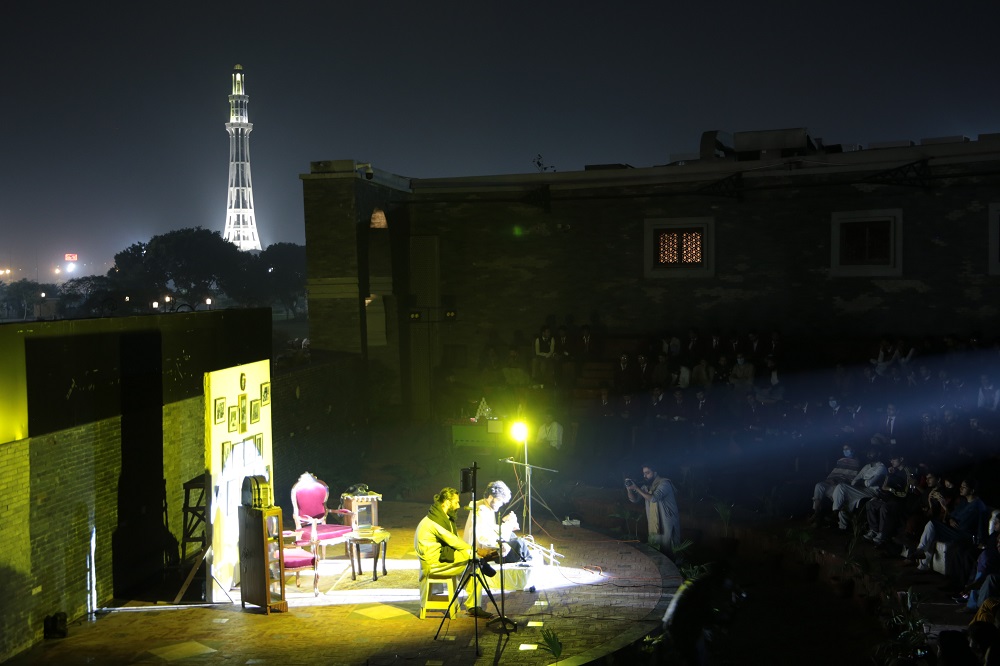Written by: Mahnaz Shujrah
Posted on: November 10, 2021 |  | 中文
| 中文
Adeel Afzal, the host of the music and poetry night, 'Iqbal Nama', reciting a poem and Allama Muhammad Iqbal
Imagine being in Lahore, the city of poets, watching Minar e Pakistan in the distant as you sit in an open-air amphitheater, with music and poetry filling the air….
“Iqbal Nama: An evening of poetry and music” took place on Sunday, November 7th to commemorate Iqbal Day, which takes place on November 9th to celebrate Iqbal’s birthday. Dr. Muhammad Iqbal is the visionary figure who conceived the idea of Pakistan as a distinct national homeland for the Muslims of the Indian subcontinent. However, Iqbal was a scholar, a philosopher and a poet. The host of the evening, Adeel Afzal initiated the evening by emphasizing this.
Adeel Afzal was the powerful voice that brought Iqbal’s poetry to life for the eager audience. A talented individual, Afzal is a writer, an actor and popular content creator. The second performer for the evening was Mujeeb Ruzik, a of native Hunza, who played the Rubab and won the hearts of the crowd. He is currently studying music at National College of Arts and is part of a band, Jiill, which is inspired by nature and folk culture. The event proceeded with different poems and excerpts of Iqbal’s work, accompanied by soulful music. The evening was hosted by National History Museum located in Greater Iqbal Park.
Four different poems/excerpts of Iqbal were recited during the event, with Afzal giving a brief introduction before each poem, and offering explanations of the more difficult verses. This invited the audience to ponder and introspect.
The first poem was Sargazisht e Adam or The Story of Adam. This was a suitable choice to begin the evening with, as this story itself represents the beginning of mankind. The second poem was Zindagi, which is stanza four of Jawab e Khizer (Khizer’s Reply). One of my favorite lines from the evening was the opening couplet of this stanza:
Bartar Az Andesha’ay Sood-O-Ziyan Hai Zindagi
Hai Kabhi Jaan Aur Kabhi Tasleem-E-Jaan Hai Zindagi
Life is higher than the calculation of profit and loss;
Life is sometimes living and sometimes forfeiting life.
The narrator emphasized that the beauty of Iqbal as a poet is that he rises above the boundaries of thought. This was evident in Iqbal’s next poem, Jibreel o Iblees, one of his most famous works. On the one hand there is Jibreel (Gabriel), the highly dignified and respected Angel, a prominent figure in all Abrahamic faiths, while on the other, there is Iblees (the Devil), the source of all evil and disobedience. Afzal said that this dialogue really fascinates him, the idea itself, of what it would be like if these two characters ever interacted. Iqbal writes brilliantly from the perspective of both the protagonists, in a way that the reader can empathize with both. The concept is a challenging one, but dealt with Iqbal’s philosophic greatness. Iqbal has the ability to see from multiple dimensions.
The order of poems was well curated, and the last one Tipu Sultan Ki Wasiyat (The Testament of Tipu Sultan) left the audience with a message. Tipu Sultan is a symbol of anti-colonial struggle who sacrificed his life in order to expel the foreign intruders from his homeland. Iqbal uses his persona to articulate beautifully his message which remains relevant to date.

The artists are busy performing at the National History Museum, located in the Greater Iqbal Park, Lahore. Minar-e-Pakistan can be seen in the background (Picture credits to National History Museum (NHM))
This Iqbal Day his words and ideals should inspire us.
Apni Dunya Ap Paida Kar Agar Zindon Mein Hai
Sirr-E-Adam Hai, Zameer-E-Kun Fikan Hai Zindagi
If you are among the living, fashion your own world;
Life is the secret of Adam, the essence of the words Be and it was!
You may also like: